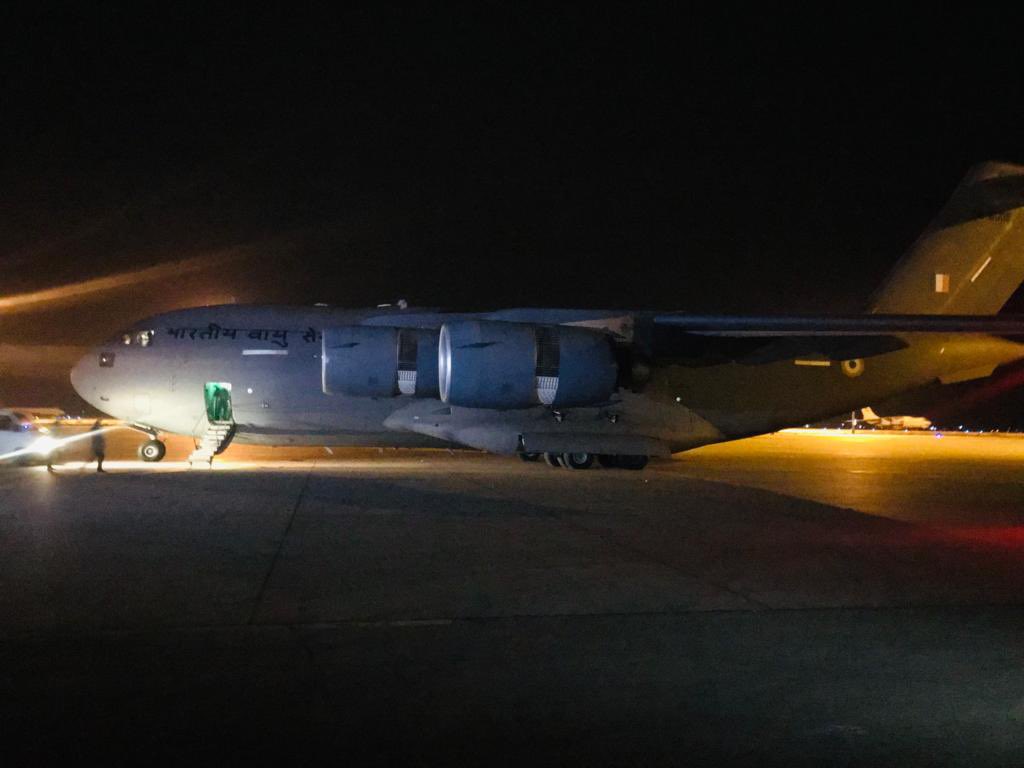

IAF’s C-17 plane heads for Syria with humanitarian supplies during earthquake
India’s quick response to the humanitarian crisis that unfolded in Syria and Turkiye in the wake of earthquakes in the two countries has been noticed across the globe. India responded immediately to the catastrophe through “Operation Dost ” providing humanitarian assistance and disaster relief (HADR) sending six tonnes of relief material.
In the following days it sent seven flights with relief material and deployed 180 Indian army personnel. While assistance to both Turkiey and Syria are laudable, it is India’s assistance to Syria that particularly stands out. With the sanctions on Syria, and the current regime of President Bashar Al Assad a pariah for most Western countries, India’s initiative has been bold and compassionate, yet another demonstration of its strategic autonomy in world affairs.
The earthquake that struck northwestern Syria and southeastern Turkiye in the early hours of February 6, measured 7.8 on the Richter scale; hours later a magnitude 7.5 temblor occurred, followed by thousands of aftershocks. While the death toll in Turkiye is estimated to be around 48,000, UN estimates put the death toll in Syria at 6000. Already ravaged by a decades long civil war and foreign intrusion, estimated to have already killed 3,00,000 Syrians, the earthquake has added to the agony and tragedy of Syrians. And while aid has poured into Turkiye from around the world, especially from fellow NATO countries, the same has not been true of Syria.
Syria’s envoy to the UN has appealed for help and for removal of the sanctions. Though the sanctions in place on Syria do not apply to humanitarian aid, help for Syrians has been slow to arrive. Syrians have expressed their dismay over social media, feeling abandoned by the international community. Reports say Syrians and local rescue teams have been forced to dig through the mountains of rubble in search of survivors using only basic machinery and, often, their bare hands. This makes India’s outreach to that country – one of the first and few non-Arab countries to do so – all the more laudable. Most of the other countries that have rushed aid to Syria are fellow Arab countries, with those like Italy and Canada announced only after the US announced sanctions waiver for Syria for 180 days to allow disaster relief.
India first sent six tones of medical aid and relief material. The Syrian Ambassador to India Dr. Bassem al Khatib has said that “his brothers’ in the Ministry of External Affairs were ready and swung into action immediately. In the following days India sent at least seven flights laden with such aid, which included relief materials, sleeping mats, gensets, solar lamps, tarpaulins, blankets, emergency and critical care medicines, and disaster relief consumables.
Considering the difficult circumstances prevalent in the country, India has sent an Army team deployed in the United Nations Disengagement Observer Force (UNDOF) mission to deliver relief material to the earthquake-affected population of Syria. The UN Disengagement Observer Force (UNDOF) mission is deployed along the Area of Separation (AOS) between Israel and Syria’s boundaries of the Golan Heights.
Not surprisingly, the international media has not cared to highlight this. But India has played a decisive role, and one which it has continued to play since the start of the civil war in Syria. India did not kowtow to Western demands and position on Syria, in spite of considerable pressure on it to do so. It has continued to recognize the government of President Bashar al Assad and consistently opposed unilateral regime change by force and external intervention, and opposed or abstained from moves that either condemned Syrian President Bashar al-Assad or called for him to step down. It as continued to maintain full-fledged diplomatic ties with Damascus, and in spite of the Ceasar Act of 2019 and the tightening of sanctions on the Syrian government, India as continued to aid Syria over the years with humanitarian aid, reconstruction work, capacity building measures of Syrian civil society through scholarships, training, etc.. In a recent visit to India, much before the earthquake, Syria’s Foreign and Expatriates Minister Fayssal Mikdad in an interview to the Indian media said “You know at a time humanity doesn’t mean anything to western power, we found all human noble concepts prevailing in Indian foreign policy. It’s not only Syria but any country suffering.”
India’s outreach to Syria has been in keeping with its civilizational ethos “Vasudeva Kutumbakam” – “the world is a family” – and its current aspirations to be a “vishwa guru”, and standing by the friendly Syrian people in their hour of need is a reflection of a continuation of this ethos.
Also Read: India among first responders to to help Turkey and Syria: PM Modi
(Aditi Bhaduri is a columnist specialising in Eurasian geopolitics. Views expressed are personal and exclusive to India Narrative)
In a significant moment for regional cinema and cultural dialogue, the premiere of 'Harmukh', the…
Union Home Minister Amit Shah on Thursday said that languages were not just a medium…
India's electric vehicle (EV) growth is significantly slower than the top 10 global standouts, according…
Taiwan's Ministry of National Defence reported today that 33 Chinese aircraft and five vessels were…
India on Thursday refused to sign a joint declaration at the Shanghai Cooperation Organisation meeting…
Union Minister of Commerce and Industry Piyush Goyal held key meetings with senior leaders of…